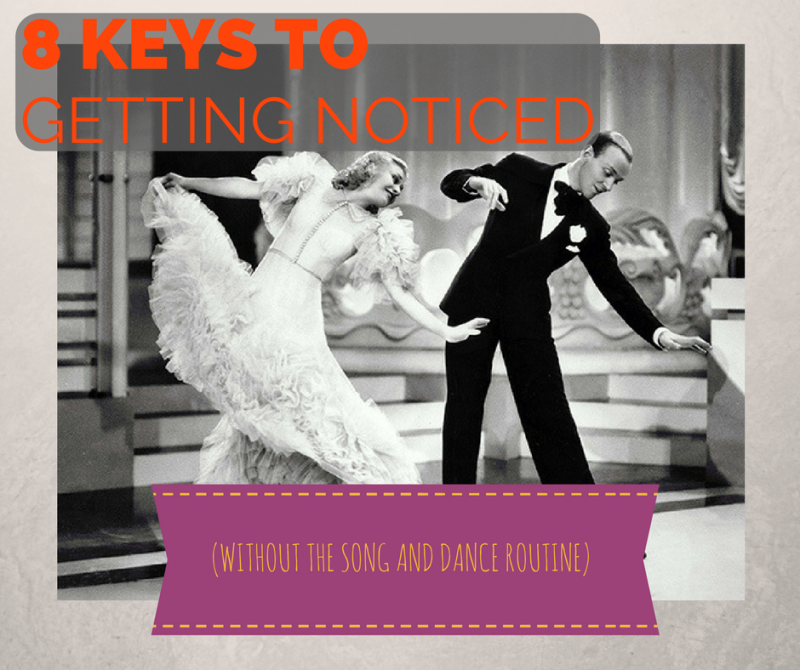I was on my second cup of breakfast tea. My husband (who was scouring the paper for teaching vacancies), looked up and sighed,
‘”Just look at this!” He poked the ad. I read it.
‘Wanted: Energetic, dynamic, enterprising team player required for this vibrant forward-looking Department’.
He groaned. “Can’t I just be good at what I do without having to do this eternal song and dance routine?”
I felt his pain. Most of the appointments echoed the same sentiments.
My husband, you see, is also an introvert. He wouldn’t describe himself as ‘energetic, dynamic or vibrant’. He just gets the job done. Quietly.
Eventually he gave up trying to balance education and entertainment and left teaching for the quieter fields of IT, where he didn’t have to play Fred Astaire.
What he came up against that day was not just our cultural bias towards extroversion but …
(more worryingly) …
its’ tendency to equate outward displays of exuberance for that inner pilot light of fervour that drives commitment, competence and leadership.
Outward enthusiasm might indicate inner commitment, but it might just be surface dressing and natural excitement. A calm, quiet exterior might mask a burning passion for something. We can’t judge by externals.
All too often, however, we ARE judged in this way.
In other words: Exuberance=good, quiet=bad. (Or maybe just ‘not worthy of attention’)
Look carefully, and you’ll see this everywhere.
Richard, a quiet 10 year old boy sits at his desk in the middle of a busy primary classroom.
“Can I have someone to help with the nature pond this afternoon?” asks his teacher. Richard is keen to help. He has a real interest in the natural world and spends time during the weekends helping his dad with conservation projects.
His arm shoots up, his eyes shine, but he doesn’t shout out.
He is a polite lad, he knows you shouldn’t shout out in class.
But all around him classmates bounce off their seats, calling out, “Me, me…pick me, miss!”
Richard sits quietly, as he knows you are meant to, and soon he is invisible among the tsunami of waving, jumping children.
“Go on then Amber, you go!” announces the teacher. Glad to be shot of the biggest wriggler in the class. Amber too is delighted… she is missing Maths.
Richard’s arm comes down slowly, and he lowers his head so that no one can see the hurt.
You can bet that the lesson he learnt that day was that to be quiet is to be overlooked; that those who shout the loudest get all the attention.
In other words, he learnt that his quiet nature often worked against him in getting what he wanted.
This is why introverts often turn themselves inside out trying to play extrovert.
This is why they fail to understand and develop their natural strengths.
This is how they learn shame.
And it has to change.
Put simply, if I’m to prove I’m keen, if I’m to stand out….I’d better be super-mega-enthusiastic and noisy. I’d better flag-wave, cheer-lead and demonstrate a lot of forced hype. Whether I’m feeling it or not.
Whether that’s the way I naturally show enthusiasm or not.
And if I don’t dance the dance, well then…I’m a cold fish, lacking zeal and probably commitment. Not to be trusted.
Shakespeare’s ‘King Lear’ is, without question, Shakespeare’s darkest, bleakest depiction of human nature. It’s visceral, gut-wrenching stuff. At its’ centre is Lear himself, a flawed and narcissistic character of vast proportions whose downfall is equally colossal.
The play opens with Lear’s fateful ‘trial of loyalty’ to each of his three daughters. A one-off test (overlooking a lifetime’s knowledge of his children) to determine who loves him the most and who will subsequently win his inheritance and favour. And the test?
It’s for each daughter to prove her love and commitment in displays of passionate and extravagant language.
If you know the story, you’ll know that the two eldest daughters, Goneril and Regan, rise to the challenge and provide Lear with glowing, if unrealistic, descriptions of their love. Cordelia, the youngest, who is actually Lear’s favourite, cannot play the game. She is unable (and unwilling) to ‘heave my heart into my mouth’, as she puts it. She speaks the truth, that she loves her father as a daughter should, ‘no more, no less’. For this, her share of the inheritance is divided between her sisters and she is banished.
Now Goneril and Regan are toxic to the core. Their declarations of love are born of flattery and manipulation and in no way represent spontaneous, innocent extrovert enthusiasm. Cordelia, likewise, isn’t the simple introvert victim. There is a certain stubbornness and pride in her truth-telling to take into account. (Not unheard of in introverts!)
But it’s Lear’s reaction that merits attention. Because he is the one who holds the cards. He is emblematic of all gatekeepers. And he (like Richard’s teacher) listens to those who shout the loudest.
Somehow, without engaging in flattery, manipulation, pushy-ness or going against our own natures as introverts, we have to find a way to be heard above the crowd in what matters to us.
So why is it so hard for us to convince others of our excitement or dedication?
It’s hard because as introverts we are naturally more reserved.
We also tend to use words sparingly. We UNDERSTATE rather than overstate..
In Introspeak, “I’m feeling a little chilly” might just mean “I’m suffering from hypothermia and will shortly keel over and die”.
(Be mindful of this with your introvert friends and family!)
Like most introverts, I try to be very ACCURATE in what I say.
When I’m really excited about something, you’ll know about it, but I’m not easily enthused. Nothing wrong with that. I just can’t manufacture enthusiasm if I don’t feel it.
If I give praise for something, I really do mean it. If I don’t say anything, it’s likely I’m not overly wowed. I don’t throw my compliments about like confetti.
Otherwise they have no meaning.
That said, accepting praise can be just as problematic for introverts. We need to scan compliments to check first that they are a) genuine and b) merited before we can really receive them, and our low-key responses can sometimes throw cold water on extroverts’ genuine attempts to express gratitude! That said, I’m learning to bend a little …to give more positive strokes, because I now know that these things are an extroverts’ lifeblood. This can sometimes feel uncomfortable, like flattery, or emotional manipulation (can’t I just say once that I appreciate them for doing the washing-up? Don’t they believe me?) but I’ve had to learn that if I don’t feed the extroverts I love regularly with praise, they end up emotionally starved. They may end up feeling I don’t care about them. I don’t want them to feel that way, because they are incredibly important to me. I’m still a work in progress, as they are.
The problem we have as quiet people then is that it can be difficult persuading people that we are really into something, or committed to something, or want something (like a new job opportunity or promotion), NOT because we’re necessarily shy or lacking in confidence, but because (like Cordelia) we don’t see the need/ can’t bring ourselves to do the required hype. It feels insincere, fabricated. False. Worse, it can feel like the worst primary school “Look at me, I’m so keen!” public display competition. I might care a great deal, but resent simple assertions of my interest and commitment not being enough.
It can feel to quiet people as if we’re caught in a lose-lose trap – be false to ourselves or seem indifferent to others. It’s not a happy choice!
So, how do we make sure our passions are heard, (particularly to gatekeepers), without denying our personalities?
We make sure our every word counts! So …
8 Keys to Being Heard:
- Pack your declarations of interest/commitment etc full of DETAIL, like cherries in a cake. Make sure every word you utter (or write) counts and reveals your introvert strengths – research, analysis, strategic and detailed forward thinking and planning. You’re good at this. You know exactly what you could add to any organisation, and where the development niches are. Think Content. Not Delivery. Quality not quantity. Show, not tell is the way forward.
- Express yourself in WRITING. Get a written statement of interest in before you have to do the talking. Again, pack with detail. Take your time thinking and planning exactly what you want to say. Show you’ve done your homework. That communicates interest more than anything.
- TARGET the right people. Sometimes you might just be in the wrong place. You need managers and others who will see beyond a slick 20 minute presentation. Align yourself with kindred spirits in an environment where you will be heard and valued. Sometimes that takes the courage to abandon ship and move on.
- BELIEVE in yourself and your unique strengths. Get to know and develop them. Don’t compare, but don’t compromise either.
- WORK WITH your natural strengths. You may be a good sympathetic listener, ideally placed to hear what’s not working so well in an organisation and to be one step ahead in identifying and coming up with a plan you can share to make things work better. That’s contributing to team working and organisation The Introvert Way.
- PICK THE RIGHT TIME! Usually when you can be alone with ‘the person who needs to hear you’. When you can guarantee their undivided attention. Approach them or email and ask for a 1-1 meeting. Don’t fight to be heard in the arena (like Richard in the classroom). Decide what you want and plan ahead. Stick to your plan.
- Don’t be discouraged if you’re not heard first time. DON’T GIVE UP! Try a different tack, a different person, a different job. Believe you have value. Because you have.
- And finally, when it seems impossible to get the attention of gatekeepers… Don’t forget that the real power is in your hands to turn your zeal into action. Don’t give away that power to others. Just keep going!
Enthusiasm is fine, but it’s commitment that counts in the end. Life is a marathon, not a sprint.
Blessings as ever,
Lynne x







Thanks Lynne really good Sandra x
LikeLike
Thank you. So glad you enjoyed it Sandra x
LikeLike
Yet again, a brilliant piece of writing with which I totally agree. I can’t stand ‘whoopee- doo-ness’. It almost always comes across as false ort attention-seeking to me. And yet it’s not always, sometimes it is just genuinely the extravert expressing themselves. Must learn this. Thanks Lynne x
> On 25 September 2016 at 18:18 all things quiet > wrote: > > Lynne posted: ” I was on my second cup of breakfast tea. My husband (who > was scouring the paper for teaching vacancies), looked up and sighed, ‘”Just > look at this!” He poked the ad. I read it. ‘Wanted: Energetic, dynamic, > enterprising team player required for th” >
LikeLike
Yet again, a brilliant piece of writing with which I totally agree. I can’t stand ‘whoopee- doo-ness’. It almost always comes across as false ort attention-seeking to me. And yet it’s not always, sometimes it is just genuinely the extravert expressing themselves. Must learn this. Thanks Lynne x –
LikeLike
Thanks Belinda! So glad you enjoyed it. I think we’re on the journey to understanding others (and ourselves) all our lives! X
LikeLike
This is so accurate Lynne – we all need to remember to approach people in different ways depending on their personality. Something so simple but often forgotten.
This kept on making me think of the James Taylor song ‘Shower the people’ and the line “I think it’s true what they say about the squeaky wheel,always getting the grease”. So true.
LikeLike
Haha! Thanks Sarah, I’d forgotten that old saying! So true. 🙂
LikeLike